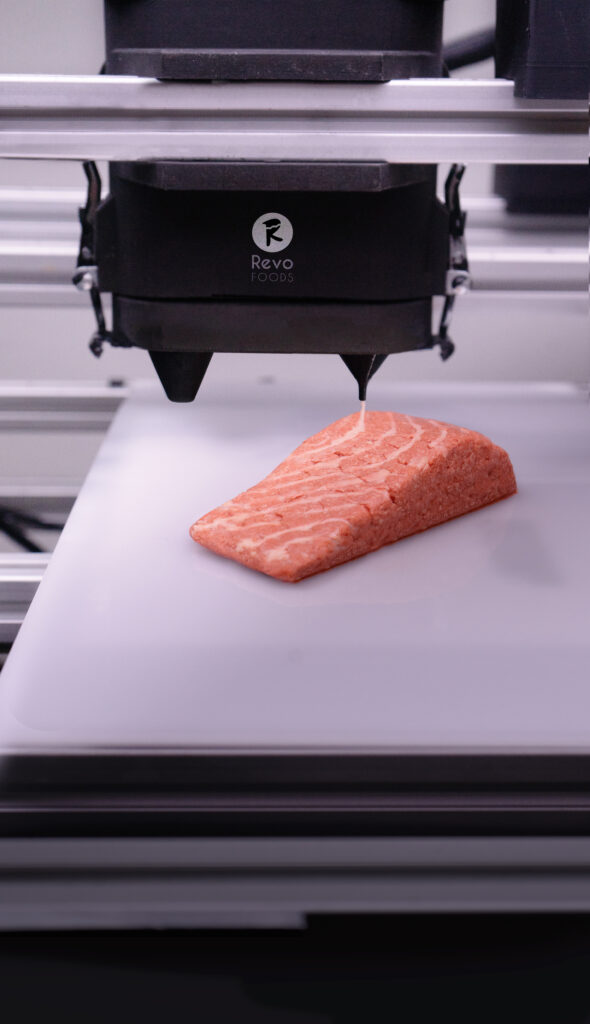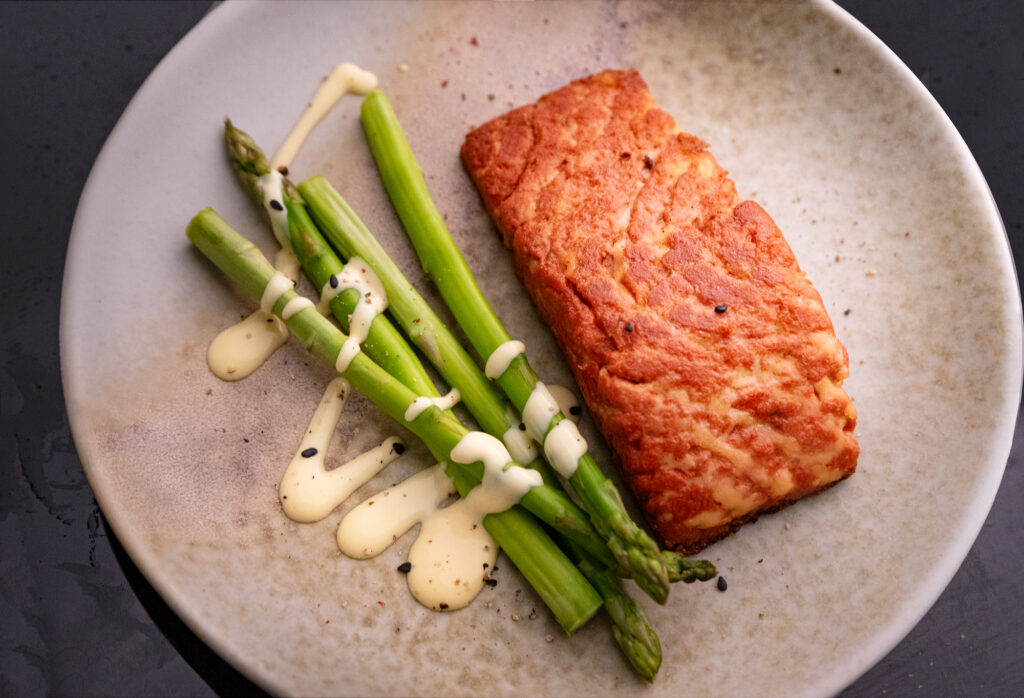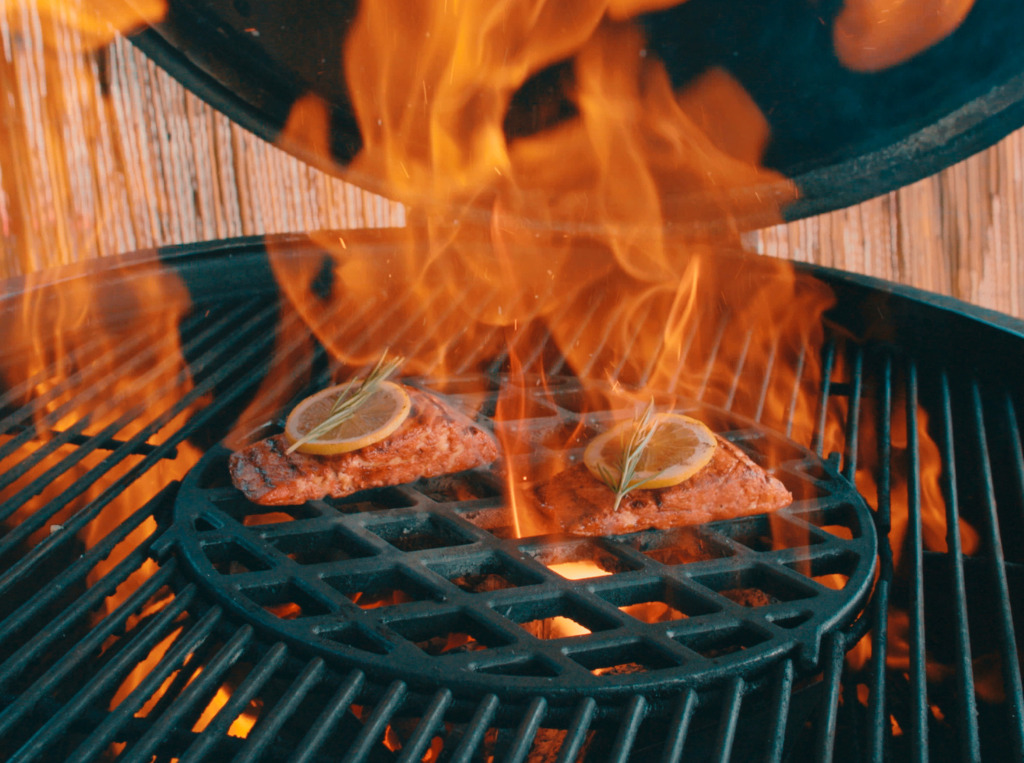Revo Foods Launches 3D-Printed Whole-Cut Vegan Salmon Filet in Vienna Supermarket
4 Mins Read
Revo Foods will launch its whole-cut salmon filet in Rewe Group’s vegan flagship store, Billa Pflanzilla, in Vienna this week, marking the first time a 3D-printed meat alternative will be on supermarket shelves, according to the company. Born out of its collaboration with Sweden’s Mycorena, the mycoprotein-based salmon employs new extrusion tech to achieve the flakiness and juice fibres associated with conventional fish.
The collaboration between the two startups was announced this January, as part of a €1.5M grant from Swedish innovation agency Vinnova, the Austrian Research Promotion Agency, and EU funding programme Eurostars. Titled ‘The Filet – Inspired by Salmon’, the mycoprotein base is a result of this partnership, using Mycorena’s Promyc protein base and engineering it specifically for 3D printing purposes.
Mycoprotein, which is essentially mycelium created from filamentous fungi, first came into the plant-based zeitgeist with Quorn’s meat-free range. The global mycoprotein segment is set to reach $976M in 2032, according to Future Market Insights, so the demand for such foods is clear.
Revo Foods’ mycelium salmon combines this ingredient with soy protein, sunflower oil, gelling agents, methylcellulose, flavourings, DHA- and EPA-rich oils, colourings, lycopene, rapeseed protein and thickening agents. It is also fortified with vitamins B6, B12 and E, as well as niacin and folic acid. The 3D-printed salmon boasts 9g of protein per 100g, with 1.7g of saturated fats (conventional salmon can have more than 18g of protein for the same amount, but 3.1g of saturated fats).
New extrusion tech enables mass production
The “ultra-realistic” salmon filet is the first food produced by Revo Foods’ patented 3D-MassFormer technology. The extrusion tech allows the “seamless integration of fats into a fibrous protein matrix”, which can recreate the flakiness and juice fibres found in conventional fish filets. Using this technology, the startup claims it has developed the first-ever continuous manufacturing process capable of mass-producing 3D-printed food. It can create what Revo Foods calls a “new generation of authentic seafood alternatives”.
“With the milestone of industrial-scale 3D food printing, we are entering a creative food revolution, an era where food is being crafted exactly according to the customer needs,” says Revo Foods CEO Robin Simsa. The brand calls this new process a “gamechanger” for plant-based meat, enabling the creation of a new category of “authentic products” like vegan steaks and filets. “Right now, we focus on seafood alternatives, but the tech is certainly applicable for many more food types,” he adds, hinting at certain partnerships the brand may announce soon.

Its deal with Rewe sees the plant-based whole cut – often described as the “holy grail” of alt-meat – launch into Rewe Group’s Billa Pflanzilla vegan store in Vienna, while European consumers can purchase the new salmon filet from Revo Foods’ website from October. It’s also available in foodservice, starting from Restaurant Adlerhorf in Vienna and Bistro Verde in Copenhagen. The company says it will move the salmon into over 1,500 stores across Europe next year.
The startup received €2.2M grant from the Austrian Research Promotion Agency last June, and closed a €1.5M in its first investment round in 2021. With a host of products already on the market, including smoked salmon, gravlax, salmon spread and tuna spread, it also launched in the UK last year. Its new salmon, which is priced between €6-7 for a 130g filet, was prepared for a panel of 10 tasters by a Michelin-starred chef in 2022 too, with overwhelmingly positive feedback – some questioned whether the dish was actually vegan.
The rise of alt-seafood
Revo Foods joins a growing alt-seafood sector with its 3D-printed whole-cut salmon filet. Industry think tank the Good Food Institute reported a 40% year-on-year increase in pound sales for vegan seafood last year. As of 2021, there were over 120 companies in the overall alt-seafood space, which includes vegan, fermentation-based and cultivated categories.
The seafood sector is inundated with climate and human rights blemishes. Overfishing operations receive $22B in capacity-enhancing subsidies annually – a figure UN special envoy Peter Thomson has called “madness”. Meanwhile, rising demand for seafood has led to higher greenhouse gas emissions, and the heavy fuel use by ocean fishery vessels also contributes to climate change. The use of plastic packaging and the presence of microplastics in the ocean exacerbate the industry’s problems – both of which are highlighted in the 2021 documentary Seaspiracy.

Speaking to Green Queen last year, Lily Ng, owner of Manhattan-based vegan seafood company Lily’s Vegan Pantry, said: “Overfishing disrupts the food chain. And when populations are diminished, other species will overpopulate, destroying biodiversity and making changes to the entire ecosystem. In the end, our consumption of fish still destroys our planet.”
It has led to increased investment and new product development in the alternative seafood category. Startups like Konscious Foods, Bluu Seafood and Hooked Foods have all received funding this year itself – in addition to the grant received by Revo Foods and Mycorena.
“Alternative seafood is a new category, with limited awareness, whereas meat is more established,” Maarten Garaets, outgoing alt-protein managing director of seafood giant Thai Union, told Green Queen in May. “However, seafood is bound to catch up soon. Health is less of a concern for seafood, whereas sustainability will be more of a lever.”



